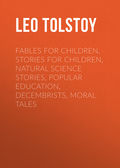
Лев Толстой
Bethink Yourselves!
VI
Two thousand years ago John the Baptist and then Jesus said to men: The time is fulfilled and the Kingdom of God is at hand; () bethink yourselves and believe in the Gospel (Mark i. 15); and if you do not bethink yourselves you will all perish (Luke xiii. 5).
But men did not listen to them, and the destruction they foretold is already near at hand. And we men of our time cannot but see it. We are already perishing, and, therefore, we cannot leave unheeded that – old in time, but for us new – means of salvation. We cannot but see that, besides all the other calamities which flow from our bad and irrational life, military preparations alone and the wars inevitably growing from them must infallibly destroy us. We cannot but see that all the means of escape invented by men from these evils are found and must be found to be ineffectual, and that the disastrous position of the nations arming themselves against each other cannot but go on advancing continually. And therefore the words of Jesus refer to us and our time more than to any time or to any one.
Jesus said, “Bethink yourselves” —i. e. “Let every man interrupt the work he has begun and ask himself: Who am I? From whence have I appeared, and in what consists my destiny? And having answered these questions, according to the answer decide whether that which thou doest is in conformity with thy destiny.” And every man of our world and time, that is, being acquainted with the essence of the Christian teaching, needs only for a minute to interrupt his activity, to forget the capacity in which he is regarded by men, be it of Emperor, soldier, minister, or journalist, and seriously ask himself who he is and what is his destiny – in order to begin to doubt the utility, lawfulness, and reasonableness of his actions. “Before I am Emperor, soldier, minister, or journalist,” must say to himself every man of our time and of the Christian world, “before any of these, I am a man —i. e. an organic being sent by the Higher Will into a universe infinite in time and space, in order, after staying in it for an instant, to die —i. e. to disappear from it. And, therefore, all those personal, social, and even universal human aims which I may place before myself and which are placed before me by men are all insignificant, owing to the shortness of my life as well as to the infiniteness of the life of the universe, and should be subordinated to that higher aim for the attainment of which I am sent into the world. This ultimate aim, owing to my limitations, is inaccessible to me, but it does exist (as there must be a purpose in all that exists), and my business is that of being its instrument —i. e. my destiny, my vocation, is that of being a workman of God, of fulfilling His work.” And having understood this destiny, every man of our world and time, from Emperor to soldier, cannot but regard differently those duties which he has taken upon himself or other men have imposed upon him.
“Before I was crowned, recognized as Emperor,” must the Emperor say to himself: “before I undertook to fulfil the duties of the head of the State, I, by the very fact that I live, have promised to fulfil that which is demanded of me by the Higher Will that sent me into life. These demands I not only know, but feel in my heart. They consist, as it is expressed in the Christian law, which I profess, in that I should submit to the will of God, and fulfil that which it requires of me, that I should love my neighbor, serve him, and act towards him as I would wish others to act towards me. Am I doing this? – ruling men, prescribing violence, executions, and, the most dreadful of all, – wars. Men tell me that I ought to do this. But God says that I ought to do something quite different. And, therefore, however much I may be told that, as the head of the State, I must direct acts of violence, the levying of taxes, executions and, above all, war, that is, the slaughter of one's neighbor, I do not wish to and cannot do these things.”
So must say to himself the soldier, who is taught that he must kill men, and the minister, who deemed it his duty to prepare for war, and the journalist who incited to war, and every man, who puts to himself the question, Who is he, what is his destination in life? And the moment the head of the State will cease to direct war, the soldier to fight, the minister to prepare means for war, the journalist to incite thereto – then, without any new institutions, adaptations, balance of power, tribunals, there will of itself be destroyed that hopeless position in which men have placed themselves, not only in relation to war, but also to all other calamities which they themselves inflict upon themselves.
So that, however strange this may appear, the most effective and certain deliverance of men from all the calamities which they inflict upon themselves and from the most dreadful of all – war – is attainable, not by any external general measures, but merely by that simple appeal to the consciousness of each separate man which, nineteen hundred years ago, was proposed by Jesus – that every man bethink himself, and ask himself, who is he, why he lives, and what he should and should not do.
VII
The evil from which men of our time are suffering is produced by the fact that the majority live without that which alone affords a rational guidance for human activity – without religion; not that religion which consists in belief in dogmas, in the fulfilment of rites which afford a pleasant diversion, consolation, stimulant, but that religion which establishes the relation of man to the All, to God, and, therefore, gives a general higher direction to all human activity, and without which people stand on the plane of animals and even lower than they. This evil which is leading men to inevitable destruction has manifested itself with special power in our time, because, having lost all rational guidance in life, and having directed all efforts to discoveries and improvements principally in the sphere of technical knowledge, men of our time have developed in themselves enormous power over the forces of nature; but, not having any guidance for the rational adaptation of this power, they naturally have used it for the satisfaction of their lowest and most animal propensities.
Bereft of religion, men possessing enormous power over the forces of nature are like children to whom powder or explosive gas has been given as a plaything. Considering this power which men of our time possess, and the way they use it, one feels that considering the degree of their moral development men have no right, not only to the use of railways, steam, electricity, telephones, photography, wireless telegraphs, but even to the simple art of manufacturing iron and steel, as all these improvements and arts they use only for the satisfaction of their lusts, for amusement, dissipation, and the destruction of each other.
Then, what is to be done? To reject all these improvements of life, all this power acquired by humanity – to forget that which it has learnt? This is impossible, however perniciously these mental acquisitions are used; they still are acquisitions, and men cannot forget them. To alter those combinations of nations which have been formed during centuries and to establish new ones? To invent such new institutions as would hinder the minority from deceiving and exploiting the majority? To disseminate knowledge? All this has been tried, and is being done with great fervor. All these imaginary methods of improvement represent the chief methods of self-oblivion and of diverting one's attention from the consciousness of inevitable perdition. The boundaries of States are changed, institutions are altered, knowledge is disseminated; but within other boundaries, with other organizations, with increased knowledge, men remain the same beasts, ready any minute to tear each other to pieces, or the same slaves they have always been, and always will be, while they continue to be guided, not by religious consciousness, but by passions, theories, and external influences.
Man has no choice; he must be the slave of the most unscrupulous and insolent amongst slaves, or else the servant of God, because for man there is only one way of being free – by uniting his will with the will of God. People bereft of religion, some repudiating religion itself, others recognizing as religion those external, monstrous forms which have superseded it, and guided only by their personal lusts, fear, human laws, and, above all, by mutual hypnotism, cannot cease to be animals or slaves, and no external efforts can extricate them from this state; for only religion makes a man free. And most of the people of our time are deprived of it.
VIII
“But, in order to abolish the evil from which we are suffering,” those will say who are preoccupied by various practical activities, “it would be necessary that not a few men only, but all men, should bethink themselves, and that, having done so, they should uniformly understand the destination of their lives, in the fulfilment of the will of God and in the service of one's neighbor.
“Is this possible?” Not only possible, do I answer, but it is impossible that this should not take place. It is impossible for men not to bethink themselves —i. e. impossible that each man should not put to himself the question as to who he is and wherefore he lives; for man, as a rational being, cannot live without seeking to know why he lives, and he has always put to himself this question, and always, according to the degree of his development, has answered it in his religious teaching. In our time, the inner contradiction in which men feel themselves elicits this question with special insistence, and demands an answer. It is impossible for men of our time to answer this question otherwise than by recognizing the law of life in love to men and in the service of them, this being for our time the only rational answer as to the meaning of human life; and this answer nineteen hundred years ago has been expressed in the Christian religion and is likewise known to the vast majority of all mankind.
This answer in a latent state lives in the consciousness of all men of the Christian world of our time; but it does not openly express itself and serve as guidance for our life, only because, on the one hand, those who enjoy the greatest authority, so-called scientists, being under the coarse error that religion is a temporary and outgrown step in the development of mankind and that men can live without religion, inculcate this error to those of the masses who are beginning to be educated; and, on the other hand, because those in power, sometimes consciously, but often unconsciously (being under the error that the Church faith is Christian religion), endeavor to support and excite in the people crude superstitions given out as the Christian religion. If only these two deceptions were to be destroyed, then true religion, already latent in men of our time, would become evident and obligatory.
To bring this about it is necessary that, on the one hand, men of science should understand that the principle of the brotherhood of all men and the rule of not doing unto others what one does not wish for oneself is not one casual idea out of a multitude of human theories which can be subordinated to any other considerations, but is an incontestable principle, standing higher than the rest, and flowing from the changeless relation of man to that which is eternal, to God, and is religion, all religion, and, therefore, always obligatory.
On the other hand, it is necessary that those who consciously or unconsciously preach crude superstitions under the guise of Christianity should understand that all these dogmas, sacraments, and rites which they support and preach are not only, as they think, harmless, but are in the highest degree pernicious, concealing from men that central religious truth which is expressed in the fulfilment of God's will, in the service of men, and that the rule of acting toward others as one would wish others to act toward oneself is not merely one of the prescriptions of the Christian religion, but is the whole of practical religion, as indeed is stated in the Gospels.
To bring about that men of our time should uniformly place before themselves the question of the meaning of life, and uniformly answer it, it is only necessary that those who regard themselves as enlightened should cease to think and to inculcate to other generations that religion is atavism, the survival of a past wild state, and that for the good life of men the spreading of education is sufficient —i. e. the spread of the most varied knowledge which is in some way to bring men to justice and to a moral life. These men should understand instead that for the good life of humanity religion is vital, and that this religion already exists and lives in the consciousness of the men of our time. Men who are intentionally and unintentionally stupefying the people by church superstitions should cease to do so, and recognize that what is important and binding in Christianity is not baptism, nor Communion, nor profession of dogmas, etc., but only love to God and to one's neighbor, and the fulfilling of the commandment of acting toward others as one wishes others to act toward oneself – and that in this lies all the law and the prophets.
If only both pseudo-Christians and men of science understood and preached to children and to the uneducated these simple, clear, and necessary truths as they now preach their complicated, confused, and unnecessary theories, all men would uniformly understand the meaning of their lives and recognize one and the same duties as flowing from this meaning.







